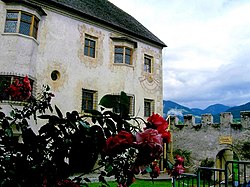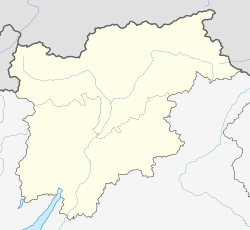Feldthurns
Feldthurns | |
|---|---|
| Gemeinde Feldthurns Comune di Velturno | |
 Velthurns Castle | |
| Coordinates: 46°40′N 11°36′E / 46.667°N 11.600°E | |
| Country | Italy |
| Region | Trentino-Alto Adige/Südtirol |
| Province | South Tyrol (BZ) |
| Frazioni | Garn (Caerne), Schnauders (Snodres), Schrambach (San Pietro Mezzomonte), Tschiffnon (Giovignano) |
| Government | |
| • Mayor | Konrad Messner |
| Area | |
| • Total | 24.8 km2 (9.6 sq mi) |
| Elevation | 851 m (2,792 ft) |
| Population (Jan. 2019)[2] | |
| • Total | 2,740 |
| • Density | 110/km2 (290/sq mi) |
| Demonym(s) | German: Feldthurner Italian: velturnesi |
| Time zone | UTC+1 (CET) |
| • Summer (DST) | UTC+2 (CEST) |
| Postal code | 39043 |
| Dialing code | 0472 |
| Patron saint | Maria |
| Website | Official website |
Feldthurns (German pronunciation: [fɛlˈtʊrns]; Italian: Velturno [velˈturno]) is a comune (municipality) and a village in South Tyrol in northern Italy about 25 kilometres (16 mi) northeast of Bolzano.
Geography
[edit]As of 30 January 2019, it had a population of 2,873 and an area of 24.8 square kilometres (9.6 sq mi).[2]
Feldthurns borders Brixen, Klausen, Villnöß and Vahrn.
Frazioni
[edit]The municipality of Feldthurns contains the frazioni (subdivisions, mainly villages and hamlets) Garn (Caerne), Schnauders (Snodres), Schrambach (San Pietro Mezzomonte), Tschiffnon (Giovignano).
History
[edit]Coat-of-arms
[edit]The emblem is party per fess: in the first part it's represented two embattled towers of gules, the second is checky of gules. It's the canting arms used in 1607 in the castle by the Bishops of Brixen and symbolize the German name of the municipality: towers (Thurn) over the fields (Feld). The emblem was granted in 1966.[3]
Notable residents
[edit]Isotopic analysis of Ötzi the Iceman's tooth enamel suggests that he may have spent his childhood in present-day Feldthurns, circa 3275 BCE.[4]
Society
[edit]Linguistic distribution
[edit]According to the 2011 census, 98.33% of the population speak German, 0.91% Italian and 0.76% Ladin as their first language.[5]
Demographic evolution
[edit]
References
[edit]- ^ "Superficie di Comuni Province e Regioni italiane al 9 ottobre 2011". Italian National Institute of Statistics. Retrieved 16 March 2019.
- ^ a b All demographics and other statistics: Italian statistical institute Istat.
- ^ "Heraldry of the World: Feldthurns". Archived from the original on 2012-07-31. Retrieved 2011-06-25.
- ^ Müller, Wolfgang; Henry Fricke; Alex N. Halliday; Malcolm T. McCulloch; Jo-Anne Wartho (31 October 2003). "Origin and Migration of the Alpine Iceman". Science. 302 (5646). AAAS: 862–866. doi:10.1126/science.1089837. PMID 14593178.
- "Who was Ötzi the Iceman?". Mummy Tombs. Archived from the original on 2007-12-17.
- ^ "Volkszählung 2011/Censimento della popolazione 2011". Astat Info (38). Provincial Statistics Institute of the Autonomous Province of South Tyrol: 6–7. June 2012. Retrieved 2012-06-14.
External links
[edit]- (in German and Italian) Homepage of the municipality
![]() Media related to Feldthurns at Wikimedia Commons
Media related to Feldthurns at Wikimedia Commons




